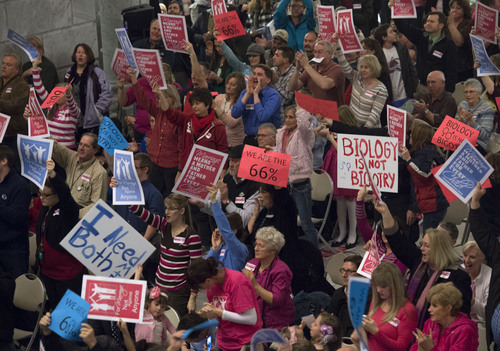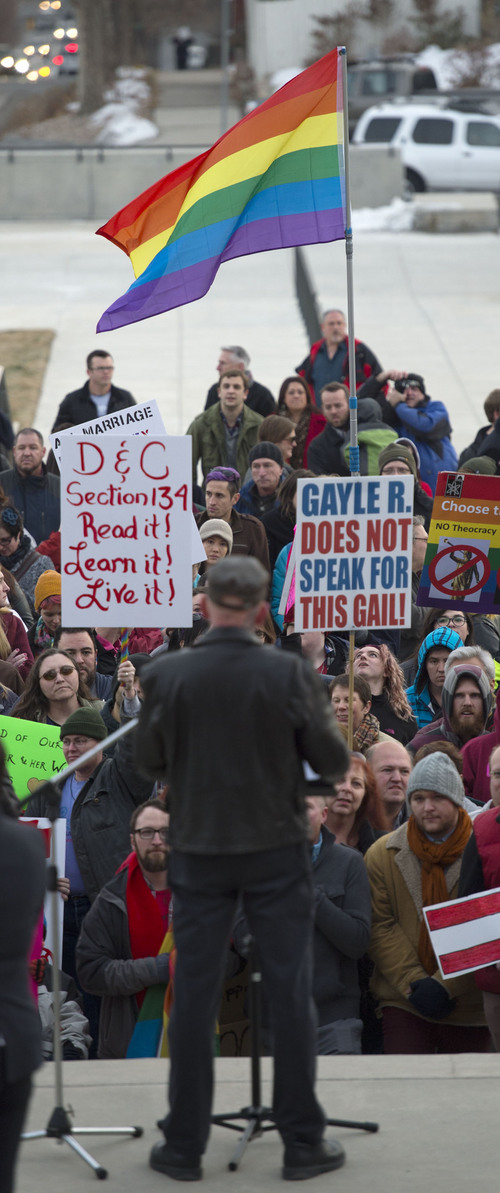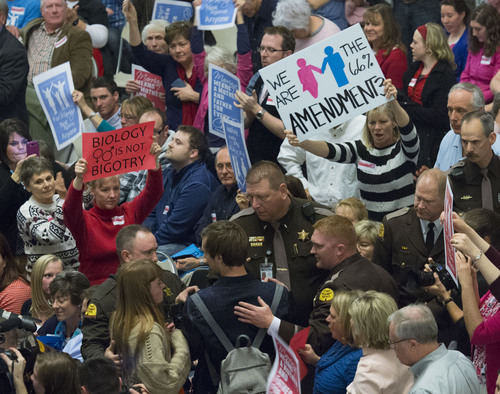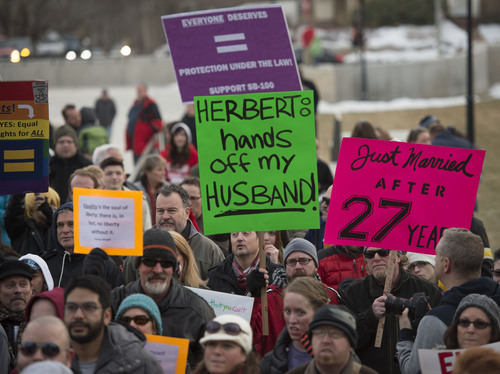This is an archived article that was published on sltrib.com in 2014, and information in the article may be outdated. It is provided only for personal research purposes and may not be reprinted.
The debate over same-sex marriage presents precisely a "political quandary" best left to individual states and their democratic processes to resolve — an authority enshrined in the U.S. Constitution and upheld in numerous U.S. Supreme Court decisions, attorneys for Utah argue in the state's latest court filing.
To allow the "difficult policy choice" about marriage rights to be made by "judicial fiat" would not be akin to the "narrow" decision that ended bans on interracial marriage, but instead would unleash "an unprincipled judicial wrecking ball hurtling toward an even more important arena of traditional state authority," the state said.
That wrecking ball would impose "novel" and "corrosive" principles about marriage and parenting and would undermine state sovereignty, according to the 120-page reply brief the state submitted to the 10th Circuit Court of Appeals just minutes before its midnight deadline Friday.
The state gets the last shot at responding to arguments made by the plaintiffs who challenged Utah's ban because it brought the appeal. The court has set oral arguments in the case for April 10 in Denver.
In their Feb. 25 filing, attorneys for the three couples said Utah's laws prohibiting same-sex marriage have "cemented discrimination" against such couples and their children, denying them basic protections and access to a marriage culture that most Utahns take for granted. The plaintiffs said those bans tell them that "they are not, and never can be, true families," the attorneys wrote.
But in its new filing, the state said the plaintiffs and U.S. District Judge Robert J. Shelby, who made the Dec. 20 ruling that the state's ban was unconstitutional, misapplied the U.S. Supreme Court's reasoning in the Defense of Marriage Act and other cases. The state also said Utah's law should be scrutinized at the lowest, rather than a heightened, legal standard.
Letting Shelby's decision stand would "bring active liberty to a screeching halt, replacing it with a homogenized, one-size-fits-all federal solution" on marriage, the state said.
It also would create "second-class sovereigns — those with populations the federal judiciary deems too backward or ill-informed to fall in line behind national opinion leaders."
Utah said Amendment 3, approved by voters in 2004, is a rational way to promote interest in heterosexual marriage and foster responsible procreation that "valorizes" opposite-sex parenting and benefits "all the state's children, present and future."
Same-sex relationships, it claims, are primarily about "personal individual interests" and an "adult-centric" lifestyle and allowing such couples to marry would have multiple repercussions.
Those risks include: fewer and shorter heterosexual marriages; an increase in fatherless and motherless parenting; reduced birth rates and more out-of-wedlock births; less "self-sacrificing" by heterosexual fathers; and increased social strife, the state said.
It also would communicate that adult interests are paramount, that neither gender nor biology matter and would delink procreation from marriage, according to the brief.
The resulting message would be that there is no reason to get married to have children, the state said, and "may lead a busy or irresponsible biological parent (usually a father, but sometimes a mother), to assume that, so long as someone is taking care of the child, there is no need for him or her to be involved."
Allowing same-sex marriage would be a greater change to the institution than allowing polygamy or arranged marriages, the state said — though it also argued that polygamy may be inevitable if gay marriage is allowed.
Attorneys for the state also argued that no one is depriving homosexual citizens of access to marriage; rather, such individuals could but "for good reason" choose not to exercise that right.
"Utah law allows every person, regardless of sexual orientation or gender, to marry a person of the opposite sex," the state said, adding in a footnote that Utah "is not trying to punish nor attempting to change anyone's sexual orientation."
And same-sex couples have other ways to secure and protect their rights and interests outside of marriage, it said.
"Utah is simply reserving the title and benefits of 'marriage' for those relationships that conform to the model Utah believes best promotes the welfare of all the state's children, present and future," it said.
And that's true even if heterosexual couples are unable to procreate, though "the vast majority of man-woman couples — even elderly couples — have at least one member who is capable of procreation."
"Each time a man-woman couple builds a marriage — regardless of their reproductive intentions or abilities — that subtly strengthen the husband-wife marriage institution and thereby enhances its power," the state said.
The state attributed Utah's high fertility rate in part to its long-standing definition of marriage and said that by giving special recognition to "couples who are able to produce offspring without biological assistance from third parties the state sends a clear, if subtle, message to all of its citizens that natural reproduction is healthy, desirable and highly valued."
Same-sex couples, who cannot naturally (much less unintentionally) procreate, do not promote the state's interests in channeling procreation, at least not in the same way or to the same degree," the state's attorneys said.
The state said claims by the plaintiffs and groups supporting them — which include the American Sociological Association and the American Psychological Association — that there is no difference in parenting quality, are irrelevant or wrong.
It also said that if same-sex marriages are allowed, religious groups might no long support state-sponsored informational campaigns extolling benefits of marriage or call on the state to get out of the marriage business altogether, leading to a privatization of marriage. There would likely be increased conflicts over the rights of businesses to refuse to serve same-sex couples.
The central question is who chooses what the marriage institution will communicate in Utah, the state said. And the answer?
"The state, through democratic processes."
"Because Utah has articulated legitimate interests that are advanced by its marriage definition, the inquiry ends," the state said.
Twitter: @Brooke4Trib —
What happens next
The three-judge panel from the 10th Circuit Court that will hear appeals from the states of Utah and Oklahoma will be randomly selected around April 1. Oral arguments in the Utah appeal are set for April 10 in Denver. Oklahoma's appeal will be heard a week later. It will likely be at least several months before the panel issues its decision; parties on the losing side may then request that the case be reviewed by all judges in the circuit or appeal to the U.S. Supreme Court.









